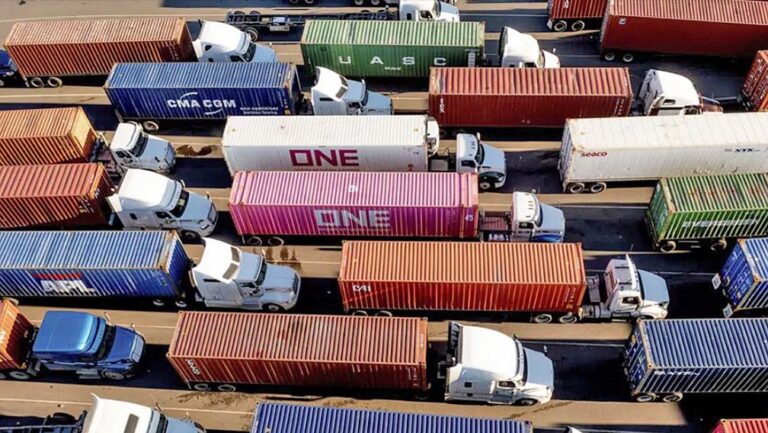SACRAMENTO, Calif. — The Biden administration cleared the way on Friday, March 31, for California’s plan to phase out a wide range of diesel-powered trucks, part of the state’s efforts to drastically cut planet-warming emissions and improve air quality in heavy-traffic areas like ports along the coast.
The decision by the U.S. Environmental Protection Agency (EPA) allows California — which has some of the nation’s worst air pollution — to require truck manufacturers to sell an increasing number of zero-emission trucks over the next couple of decades. The rule applies to a wide range of trucks including box trucks, semis and even large passenger pick-ups.
“Under the Clean Air Act, California has longstanding authority to address pollution from cars and trucks. Today’s announcement allows the state to take additional steps in reducing their transportation emissions through these new regulatory actions,” said EPA Administrator Michael Regan, in a statement.
Gov. Gavin Newsom applauded the state’s role as a leader for setting ambitious vehicle emission standards.
“We’re leading the charge to get dirty trucks and buses – the most polluting vehicles – off our streets, and other states and countries are lining up to follow our lead,” the Democrat said in a statement.
Reaction among those in the trucking industry, however, wasn’t as pleasant.
“This is another example of California approving onerous regulations that increase operating costs for truckers within the state. Whether its CARB emissions requirements or misguided legislation like AB5, it’s no surprise we’re seeing small-business truckers and independent contractors looking for opportunities elsewhere,” Owner-Operator Independent Drivers Association (OOIDA) President Todd Spencer said in a statement. “Vehicle reliability and affordability are top priorities for OOIDA members. We have yet to see proof that electric CMVs are a realistic option for most trucking businesses considering the price tag and lack of charging infrastructure. The bottom line is that the technology they’re trying to mandate does not yet exist.”
American Trucking Associations President and CEO Chris Spear said the EPA’s decision to allow California “to move forward with damaging and unrealistic emissions rule” will harm the industry nationwide.
“By granting California’s waiver for its so-called ‘advanced clean trucks’ rule, the EPA is handing over the keys as a national regulator,” Spear said. “This isn’t the United States of California, and in order to mollify a never satisfied fringe environmental lobby by allowing the state to proceed with these technologically infeasible rules on unworkable and unrealistic timelines, the EPA is sowing the ground for a future supply chain crisis.”
“As we learned since the pandemic, our supply chain is fragile, and even small disruptions can cause huge problems nationally and globally, and by allowing this incredibly disruptive, ill-conceived regime to move forward, EPA is creating a terrible mess for the hard-working men and women of our industry and the country to clean up,” he continued. “We have and will continue to work tirelessly with the EPA on aggressive, achievable timelines for reducing emissions. Over the past 35 years, that collaboration has produced a 98% reduction in truck emissions. We continue to be committed to the path to zero, and we hope EPA will, as it becomes clear that California’s rhetoric is not being matched by technology, reverse course and create a single, achievable national standard.”
The EPA typically sets standards for tailpipe emissions from passenger cars, trucks and other vehicles, but California has historically been granted waivers to impose its own, stricter standards. Other states can then follow suit, and eight other states plan to adopt California’s truck standards, Newsom’s office said. In a letter last year, attorneys general from 15 states, Washington, D.C., and New York City urged the EPA to approve the California truck standards.
The transportation sector accounts for nearly 40% of California’s greenhouse gas emissions. Newsom has already moved to ban the sale of new cars that run entirely on gasoline by 2035. The EPA has not acted on those rules.
The new truck standards are aimed at companies that make trucks and those that own large quantities of them. Companies owning 50 or more trucks will have to report information to the state about how they use these trucks to ship goods and provide shuttle services. Manufacturers will have to sell a higher percentage of zero-emission vehicles starting in 2024. Depending on the class of truck, zero-emission ones will have to make up 40% to 75% of sales by 2035.
California has a long legacy of adopting stricter tailpipe emission standards, even before the federal Clean Air Act was signed into law, said Paul Cort, a lawyer with environmental nonprofit Earthjustice.
“We have a vehicle problem,” Cort said. “We’re addicted to our cars and trucks, and that’s a big cause of the air pollution that we’re fighting.”
But Wayne Winegarden, a senior fellow at the Pacific Research Institute, said it’s too soon to adopt the California standards.
“The charging infrastructure is certainly not there,” he said about powering stations for electric vehicles. “And on top of the charging infrastructure, we have the grid issues.”
While California was hit this winter by atmospheric rivers that soaked much of the state, it has for years suffered from drought conditions, and in September, a brutal heat wave that put its electricity grid to the test.
The announcement came as advocates are pushing for more ambitious tailpipe emissions standards in other states and at the national level.
“We don’t just fight for California, we fight for all of the communities,” said Jan Victor Andasan, an activist with East Yard Communities for Environmental Justice. The group advocates for better air quality in and around Los Angeles, the nation’s second-most populous city that is known for its dense traffic and intense smog.
Andasan and other environmental activists from across the country who are a part of the Moving Forward Network, a 50-member group based at Occidental College in Los Angeles, met with EPA officials recently to discuss national regulations to limit emissions from trucks and other vehicles.
But some in the trucking industry are concerned about how costly and burdensome the transition will be for truck drivers and companies.
“The state and federal regulators collaborating on this unrealistic patchwork of regulations have no grasp on the real costs of designing, building, manufacturing and operating the trucks that deliver their groceries, clothes and goods,” said Chris Spear, president of the American Trucking Association, in a statement.
“They will certainly feel the pain when these fanciful projections lead to catastrophic disruptions well beyond California’s borders,” he added.
Federal pollution standards for heavy trucks are also getting tougher. The EPA released rules that will cut nitrogen oxide pollution, which contributes to the formation of smog, by more than 80% in 2027. The agency will propose greenhouse gas emissions limits this year.
The agency expects the new standards and government investment will lead to zero-emissions electric and hydrogen fuel cell trucks carrying most of the nation’s freight.
California activists Andasan and Brenda Huerta Soto, an organizer with the People’s Collective for Environmental Justice, are troubled by the impact of pollution from trucks and other vehicles on communities with a large population of residents of color that live near busy ports in Los Angeles, Oakland and other cities as well as warehouse-dense inland areas.
Huerta Soto works in Southern California’s Inland Empire, where a high concentration of trucks pass through to transport goods. On top of truck pollution, the many cars, trucks and trains that travel through the area burden residents with noises, odors and pollutants these vehicles emit, she said.
“We have the technology, and we have the money” to move toward zero-emission vehicles, she said.
The Associated Press contributed to this report.
The Trucker News Staff produces engaging content for not only TheTrucker.com, but also The Trucker Newspaper, which has been serving the trucking industry for more than 30 years. With a focus on drivers, the Trucker News Staff aims to provide relevant, objective content pertaining to the trucking segment of the transportation industry. The Trucker News Staff is based in Little Rock, Arkansas.









Well then FUCK craplifornia !!!! Let them pick up their own shit at the border…typical stupid rules without looking at the real issues…how about getting some of those fucking four-wheelers off the road…dumb as dirt idiots